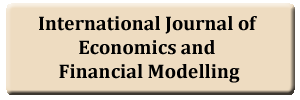Security Expenditure: Implications on Economic Growth in Nigeria
DOI:
https://doi.org/10.20448/802.72.234.246Keywords:
Economic growth, Internal security expenditure, External security expenditure, Education expenditure, Health expenditure.Abstract
The increasing level of insecurity and the consistent rise in budgetary allocation to security issues make it imperative to examine how funds expended on security have affected economic growth in Nigeria. To achieve this purpose, data on external, internal security expenditure, education and health care expenditure and growth of GDP were sourced from the CBN bulletin and analysed using the Autoregressive and distributed lag (ARDL) model. The results show that security expenditure (external and internal) stimulated real economic growth significantly in the long run and in the short run at lags levels. However, at level in the short run, security expenditure retarded economic growth significantly. This implies that security expenditure has serious implications on the growth of Nigeria’s economy. The outcome of this study tends to corroborates the high budgetary allocation to security at all the tiers of government and the stunted growth recorded in Nigeria. The result further shows that expenditure on education spurred real economic growth both in the long and short runs. This implies that educational spending drives productivity and growth. However, health care spending was found to have retarded real economic growth both in the long and short run. The low budgetary allocation to the health sector, decay in health infrastructure and brain drain in the sector may have accounted for this result. Based on this findings, the paper recommends: an improvement and proper utilisation of security funds and an increase in budgetary allocation to the education sector as ways of stimulating growth in Nigeria.




